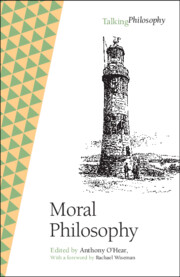Book contents
- Moral Philosophy
- Talking Philosophy
- Moral Philosophy
- Copyright page
- Contents
- Foreword
- Preface
- List of Contributors
- Rationality and Goodness
- Acting well
- Apprehending Human Form
- Does Modern Moral Philosophy Rest on a Mistake?
- Absolutes and Particulars
- On the So-called Logic of Practical Inference
- Absolute Prohibitions without Divine Promises
- Moral Obligation
- The Lesser Evil
- The Ethics of Co-operation in Wrongdoing
- Authority
- The Force of Numbers
- Reason, Intention, and Choice
- Modern Moral Philosophy and the Problem of Relevant Descriptions
- Index
- References
Acting well
Published online by Cambridge University Press: 19 May 2022
- Moral Philosophy
- Talking Philosophy
- Moral Philosophy
- Copyright page
- Contents
- Foreword
- Preface
- List of Contributors
- Rationality and Goodness
- Acting well
- Apprehending Human Form
- Does Modern Moral Philosophy Rest on a Mistake?
- Absolutes and Particulars
- On the So-called Logic of Practical Inference
- Absolute Prohibitions without Divine Promises
- Moral Obligation
- The Lesser Evil
- The Ethics of Co-operation in Wrongdoing
- Authority
- The Force of Numbers
- Reason, Intention, and Choice
- Modern Moral Philosophy and the Problem of Relevant Descriptions
- Index
- References
Summary
I am very happy indeed to contribute to this series of lectures, especially because I owe most of my training in philosophy to Elizabeth Anscombe, whose work has given the series its name. I am deeply indebted to the marvellous generosity of her teaching, to the example she set me of an unrelentingly thorough and serious thinker, to the unobtrusive way she introduced me to Wittgenstein’s later philosophy. Through Elizabeth Anscombe I also made the acquaintance of my friend Philippa Foot, whose work in moral philosophy has, over decades and more than anyone else’s, influenced my own. I hope it will be possible to recognize in what I am going to say here not indeed the excellence but at least traces of the beneficial influence of both these philosophers.
- Type
- Chapter
- Information
- Moral Philosophy , pp. 22 - 73Publisher: Cambridge University PressPrint publication year: 2022



